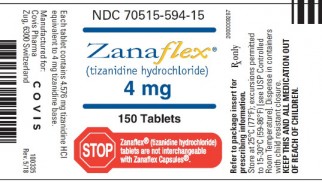When can you buy and use Zanaflex?


Zanaflex is one of the names for the marketing of the medicinal substance Tizanidine which is a central skeletal muscle relaxant. It stimulates the receptors of the spinal cord suppressing the release of the mediator amino acids that stimulate receptors for N-methyl-D-aspartate (NMDA receptors), which leads to inhibition of polysynaptic transmission of excitation in the spinal cord. It regulates the tone of skeletal muscles. Since it is this the mechanism that is responsible for excess muscle tone, when it is suppressed, muscle tone decreases.
When is the medication used?

You can buy Zanaflex or its analogs for:
- Painful muscle spasm due to different causes.
- Spastic muscle contractions due to multiple sclerosis.
- Spastic muscle contractions due to spinal cord injuries.
- Spastic muscle contractions due to brain damage.
Zanaflex has a narrow therapeutic range and high variability in the concentration in plasma in different patients. Therefore, it is important to use it in optimal doses according to the needs of the patient. The therapy should begin with a low dose of 2 mg, which makes the risk of undesirable effects from taking the drug minimal. If necessary, it can be gradually raised with all the required precautions.
Adults
- Relieving painful muscle cramps: 2-4 mg are used 3 times a day. In severe cases, at bedtime, an additional dose of 2 or 4 mg is taken.
- Spasticity in neurological disorders. The dose should be selected individually for each patient. The initial daily dosage must not be higher than 6 mg, divided into 3 doses. It can be raised gradually to 2–4 mg 2 times at intervals of 3–7 days. Usually, the optimal effect is achieved with a daily dose of 12-24 mg, divided into 3 or 4 doses. Do not exceed the total daily dose of 36 mg.
When is the use of Zanaflex contraindicated?
Do not buy generic Zanaflex in case of:
- Hypersensitivity to tizanidine or any other component of the medication. -Severe impairment of liver function. - If you use potent CYP 1A2 inhibitors such as Fluvoxamine or ciprofloxacin.
What adverse effects can Zanaflex cause?
Drowsiness, fatigue, dizziness, dry mouth, lowered blood pressure, nausea, digestive tract disorders and elevated levels of transaminases in the blood plasma - are usually mild and transient in patients using the drug in low doses, recommended for stopping painful muscle spasm.
When taken in doses exceeding the recommended, to eliminate spasticity, the above adverse reactions occur more often and are more pronounced, however, they are rarely so serious as to discontinue treatment.
Additional adverse effects may also occur such as arterial hypotension, irregular heartbeat, muscle weakness, sleep disturbance, hallucinations, and hepatitis.
The appearance of such symptoms is also registered after the sudden withdrawal of the medication, especially after prolonged treatment and/or use at high daily doses and/or concomitant therapy with antihypertensive drugs. Under such circumstances, patients may experience hypertension and tachycardia. In some cases, such rebound hypertension can cause a stroke. Therefore, treatment with tizanidine should not be stopped suddenly, but only by gradually reducing the dose.
Where can you buy Zanaflex cheap?

First of all, to get the medication cheap, you should opt for a generic version that is basically the same drug but made by another pharmaceutical company. You can buy Tizanidine under a different name at an online drugstore linked to the name of the drug. There you can find only the best generics with free shipping on orders over $170.
(Updated at Apr 13 / 2024)
Zanaflex articles:
Some of the trademarks used in this Web Site appear for identification purposes only.
All orders are reviewed by a licensed physician and pharmacist before being dispensed and shipped.
The statements contained herein are not intended to diagnose, treat, cure or prevent disease. The statements are for informational purposes only and is it not meant to replace the services or recommendations of a physician or qualified health care practitioner. If you have questions about the drugs you are taking, check with your doctor, nurse, or pharmacist.